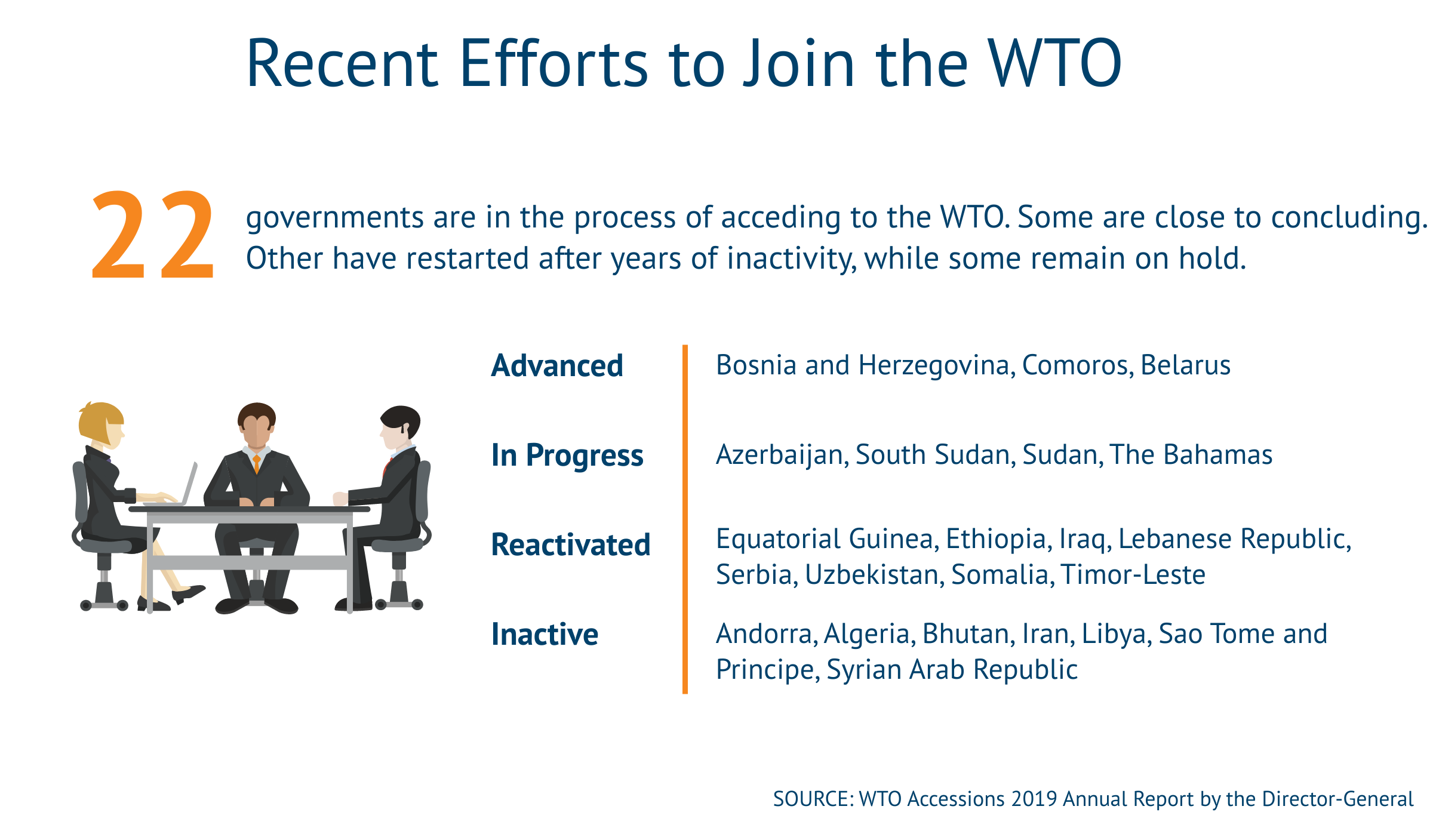Published 05 January 2018
New WTO members Afghanistan and Liberia are cheerleaders for other countries seeking WTO membership. These countries are resolved to rebuild their post-conflict economies and believe that making commitments in the WTO will undergird necessary, but difficult, economic reforms at home.
This Year, Rebuild the Economy
Afghanistan is the most recent member of the World Trade Organization (WTO). Its entry was quietly executed, but represented a bold initiative by a government beset with an array of political, economic, and security challenges. Liberia is also a recent entrant, viewing membership as a path to economic recovery from civil war and the tragic consequences of the Ebola disease that tore at its fragile social and economic fabric.
These new members have become cheerleaders for other countries seeking WTO membership. Bosnia and Herzegovina is working to complete its accession early in 2018. Belarus, Iraq, Somalia and Timor-Leste are also in the queue.
What do these countries have in common? They are resolved to rebuild their post-conflict economies. They see benefits in making commitments within the WTO that will undergird necessary, but difficult, economic reforms at home. And they share the view that the WTO community will support them in peaceable negotiations, in spite of the political complexities of international relations away from the trade table.
The Journey of Self-Discovery and Accountability
Experts say individuals are more likely to reach their goals if they write them down and share them publicly to hold themselves accountable. Like stepping on the scale to learn your starting point, aspiring WTO members submit descriptions of their existing trade regimes for review by other members. It’s a time consuming and detailed technical effort that can take years to complete, but which serves to set the baseline for negotiating their terms of membership. As important, the resulting package of commitments will inform the government’s roadmap for economic reforms and recovery.
That’s why WTO members work hard to support acceding governments. With smaller, developing countries and those recovering from conflict, it’s not about the economic gains from driving a hard bargain and winning concessions. It’s about ensuring these countries are well-positioned and supported in their efforts to implement their commitments, which members believe will bring economic gains to those countries – and with economic gains, more lasting security and stability.
Join a Like-Minded Community
Five more nations joined the WTO in recent years, bringing the total to 164 members, who collectively account for more than 98 percent of world trade. Twenty-one governments are now in the process or have stated their intention to accede to the WTO.

Governments cannot make it through the process on sheer desire to integrate into the global economy; a serious commitment must be made to economic reforms that may prove difficult for leaders to navigate politically at home.
In many cases, they must enact legislative and regulatory changes to conform to WTO obligations, and complete detailed negotiations with members on what level of market access they will provide upon entry into the WTO. The deal can feel like a one-sided negotiation because the acceding government must make all the changes in its own market before reaping the benefits of membership, something that can be exceedingly difficult to garner public support for. The economic gains will be long-lasting but, like many of our own personal resolutions, the results require delayed gratification.
Get Support
The WTO, other international organizations, and existing WTO members (including the United States) offer technical assistance to governments seeking membership. “Working Parties” are formed that shepherd governments through the accession process. The WTO Secretariat might send staff to capitals to support government leaders and their technical teams.
We are often inspired and encouraged by stories about people who started in a similar or worse place, yet achieved their goals. Last year, the Government of Kenya led an effort to assist countries in Africa with their accessions through an exchange on lessons learned; three countries from the Middle East shared views at a public forum on the national context in which their accessions were occurring and what benefits they anticipated from accession. A similar forum is scheduled in Central Asia in 2018 for peer governments in the region. These forums provide validation, political reinforcements, and technical support.
It Takes More Than Willpower
At the start of every new year, we make resolutions. We pledge to shed habits that don’t serve us well and to take up new approaches that will help us reach our potential. Aspiring WTO members have decided on a course of action. Their goals are lofty — rebuild economies devastated by years of conflict and instability, reclaim livelihoods, and provide opportunities to improve the standard of living for their citizens. Achieving difficult goals requires more than willpower. It requires a support system. For the lineup of governments seeking WTO membership, the accession process and entry to the world’s trade club should serve to strengthen their resolve.
Read more:
For detailed information on the status of accessions in progress, refer to the WTO’s annual reports.
For a quick check on where each accession stands, use this chart.
To become more familiar with the accession process, try the WTO’s training module.
Feature photo credit: WTO. Afghanistan became the 164th member of the WTO in July 2016 , after nearly 12 years of negotiating its accession terms.
© The Hinrich Foundation. See our website Terms and conditions for our copyright and reprint policy. All statements of fact and the views, conclusions and recommendations expressed in this publication are the sole responsibility of the author(s).




